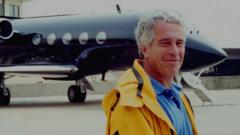Did a Doctor Poison Patients to Showcase His Resuscitation Skills?

Published: 2025-09-08 21:32:56 | Category: News
This article delves into the shocking case of Frédéric Pechier, a prominent anaesthetist in France accused of deliberately poisoning 30 patients to showcase his resuscitation skills. The trial has captivated the medical community and the public alike, raising questions about medical ethics and the responsibilities of healthcare professionals.
Last updated: 26 October 2023 (BST)
Key Takeaways
- Frédéric Pechier is accused of poisoning patients at two clinics between 2008 and 2017.
- The trial is unprecedented in French legal history, involving over 150 civil parties.
- 12 patients reportedly died as a result of these alleged actions.
- Pechier denies all charges, attributing patient complications to medical errors by colleagues.
- The case has raised significant concerns about medical ethics and patient safety.
The Allegations Against Frédéric Pechier
Frédéric Pechier, 53, is currently on trial in France, facing grave accusations of poisoning patients while working as an anaesthetist. Prosecutors claim that he acted as the "common denominator" in multiple cases of cardiac arrest at two medical clinics in Besançon, a city in eastern France. Between 2008 and 2017, numerous patients suffered from unexpected cardiac complications during routine procedures, leading to an extensive investigation that has lasted eight years.
Details of the Allegations
Pechier is alleged to have tampered with intravenous (IV) bags, introducing toxic substances with the intent to harm his patients. Prosecutor Etienne Manteaux stated that Pechier's actions were driven by a desire to demonstrate his skills as a resuscitator, positioning himself as a hero in situations he had created. This twisted narrative casts a shadow over the medical profession, raising critical questions about trust and integrity in healthcare.
The Victims
The case involves 30 alleged victims, with the youngest being just four years old. This child, referred to as Teddy, reportedly survived two cardiac arrests during a routine tonsil operation in 2016. Tragically, 12 of the patients involved in the case did not survive, with their deaths contributing to the serious nature of the accusations against Pechier. The oldest alleged victim was 89 years old, highlighting the wide range of patients affected.
The Trial and Its Implications
The trial is set to continue until December, drawing significant media attention and public interest. It includes more than 150 civil parties representing the victims, reflecting the broad impact of the alleged crimes. The prosecution's arguments are built on a foundation of numerous reports detailing serious adverse events linked to Pechier's practices during his time as an anaesthetist.
Medical Community Reactions
The case has shocked the medical community, prompting discussions about the safety protocols in place within operating theatres. Pechier’s colleagues have described him in contrasting ways: some view him as a highly skilled “star anaesthetist,” while others label him as arrogant and manipulative. This duality raises questions about the culture within the medical profession and how it may have contributed to the alleged actions.
The Investigation Timeline
The investigation into Pechier's practices began in 2017, following reports of suspicious cardiac arrests among patients who were considered low-risk. Over the years, authorities reviewed more than 70 reports of serious adverse events, indicating a systemic issue that required scrutiny. The length and complexity of the investigation underscore the seriousness of the allegations and the potential for far-reaching consequences within the healthcare sector.
Accusations and Defence
Throughout the trial, Pechier has maintained his innocence, asserting that he has never poisoned anyone. He has blamed the alleged poisonings on "medical errors" made by his colleagues, attempting to shift the focus away from his actions. This defence strategy raises ethical questions about accountability in medicine, especially in high-stakes environments like surgery.
What Happens Next?
As the trial unfolds, it will be crucial to observe how the legal system addresses these unprecedented allegations. The outcome could set important precedents regarding medical malpractice and the accountability of healthcare professionals. Additionally, the case may lead to reforms in patient safety protocols and the way medical professionals are monitored and held to account.
FAQs
What charges is Frédéric Pechier facing?
Frédéric Pechier is charged with poisoning 30 patients, leading to severe complications, including the deaths of 12 individuals. The case is unprecedented in French legal history.
How did the investigation into Pechier begin?
The investigation began in 2017 after reports emerged of unusual cardiac arrests among patients during low-risk surgical procedures, prompting authorities to examine Pechier's practices.
What are the potential implications of this trial?
The trial could lead to significant changes in medical protocols and accountability measures in the healthcare system, impacting how healthcare professionals are monitored and held responsible for their actions.
How many victims are involved in this case?
There are 30 alleged victims in the case, with a range of ages from a four-year-old child to an 89-year-old adult, demonstrating the diverse impact of the accusations.
What is Pechier's defence strategy?
Pechier's defence revolves around his claims of innocence, arguing that any adverse events were the result of medical errors made by his colleagues rather than his own actions.
The outcome of this trial could resonate beyond the courtroom, influencing public trust in the medical profession and shaping future practices in patient care. Will this case prompt significant reforms in how medical professionals are held accountable? #MedicalEthics #PatientSafety #LegalReform



